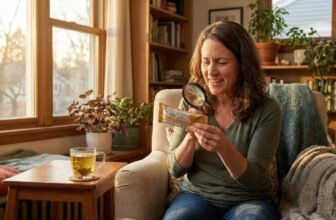
What if I told you that the happiest kids often die youngest?
Or that having a busier brain might actually be killing you faster?
Sounds crazy, right? But here’s the thing – after diving deep into the most comprehensive longevity research ever conducted, I discovered some mind-blowing truths that completely flip our understanding of healthy aging on its head.
We’re talking about 86 years of data from Harvard’s most famous study, tracking over 2 million people across multiple generations. And the results? They’re nothing like what you’d expect.
Forget Everything You Think You Know About Longevity
🏆 The Ultimate Longevity Predictor at Age 50
Let me start with something that’ll shock you.
Your relationships matter more than your cholesterol levels.
I know, I know. Your doctor’s been hammering you about those numbers for years. But Harvard researchers discovered something incredible after following people for nearly nine decades: the quality of your relationships at 50 predicts how healthy you’ll be at 80 better than any blood test.
Think about that for a second.
Not your weight. Not your blood pressure. Not even your family history.
Your friendships.
The Social Connection That’s Stronger Than Medicine

Here’s where it gets really interesting.
People with strong social ties have a 50% better chance of survival than those who are isolated. That’s the same boost you get from quitting smoking!
But wait – it’s not just about having people around you.
The researchers found that social integration (meaning you feel connected and supported) increases your survival odds by 91%. Meanwhile, just living with other people barely moves the needle.
Quality beats quantity every single time.
So that toxic relationship you’re staying in “for companionship”? It might actually be shortening your life. That book club you’ve been meaning to join? It could add years to your life.
Wild, right?
The Happy Kid Paradox That Stunned Scientists

Okay, here’s the part that made me do a double-take.
The most cheerful, optimistic kids actually lived shorter lives than their more serious peers.
I’m not making this up. The Longevity Project tracked 1,500 people for 80 years, and this finding was so shocking that even the lead researcher said it “astounds people, including us.”
Here’s what happened:
Those happy-go-lucky kids grew up to take more risks. They smoked more, drank more, and basically ignored their doctor’s advice because, hey, life’s good!
Meanwhile, the conscientious, responsible kids – the ones who did their homework and followed the rules – lived an average of 2-4 years longer.
The lesson? A little healthy worry about your well-being is actually… well, healthy.
Your Brain Might Be Working Too Hard (And It’s Aging You)

Now, this next discovery took scientists two years to get published because it was so controversial.
People with quieter brains live longer.

Think about that. We’ve spent decades believing that more brain activity equals better health. Turns out, we had it backwards.
Harvard researchers found that people who lived beyond 85 had significantly more of a gene called REST, which basically tells your neurons to chill out.
When they tested this in the lab, reducing brain activity made worms live one-third longer.
So all that multitasking, constant stimulation, and mental chaos we call modern life? It might literally be killing us.
Makes you want to try meditation, doesn’t it?
The Numbers Don’t Lie: Here’s Exactly How Many Years You Can Add
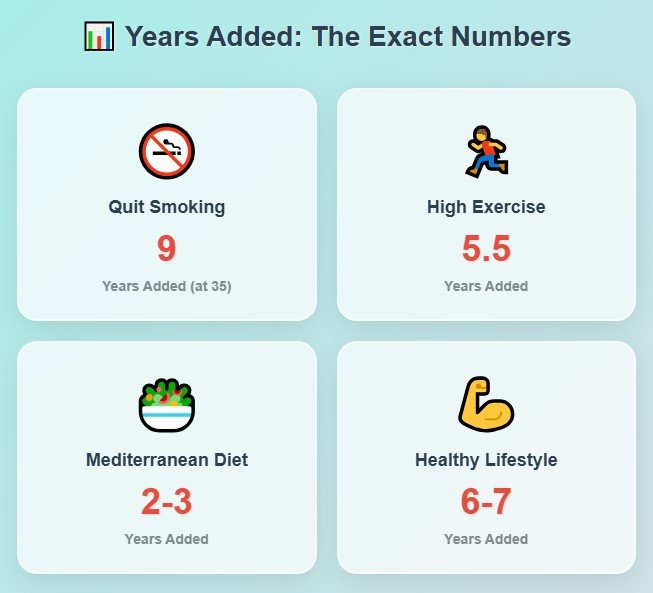
Let’s get specific about what actually works:
Quitting Smoking (The Big One)
- Quit at 35: Add 9 years
- Quit at 45: Add 6 years
- Quit at 75: Still add 1 year
Physical Activity (But Not What You Think)
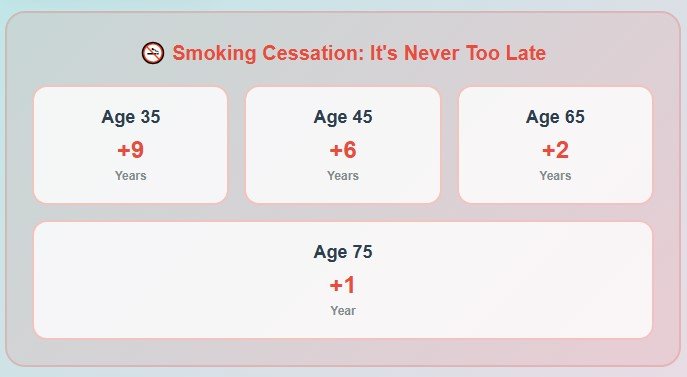
The Copenhagen study followed people for decades and found:
- Light activity: +2.8 years
- Moderate intensity: +4.5 years
- High-intensity: +5.5 years
But here’s the kicker: 1-2 hours of light jogging per week gave people the maximum benefit. More wasn’t necessarily better.
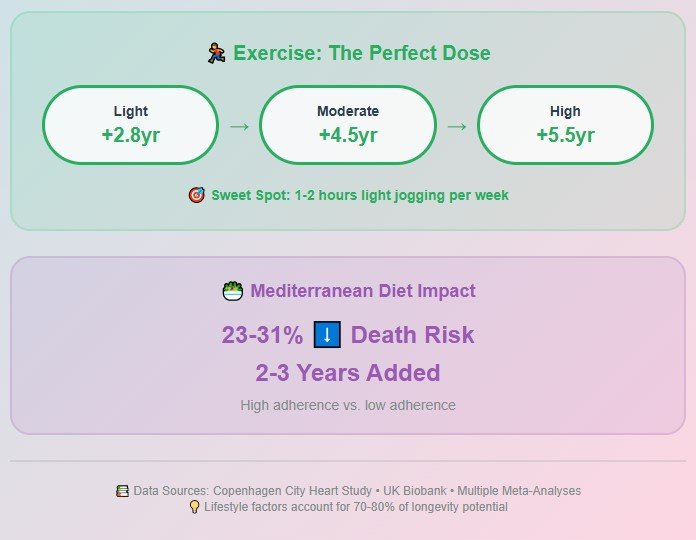
Mediterranean Diet
- High adherence: 23-31% reduction in death from all causes
- Translation: 2-3 extra years of life
The Global Longevity Hotspots (And What They’re Doing Right)
🌍 Blue Zones: Global Longevity Hotspots
(was highest globally)
- Hara Hachi Bu (eat until 80% full)
- Ikigai (life purpose)
- Strong social networks (moai)
- Plant-based diet with fish
than average
- Shepherding lifestyle (physical activity)
- Cannonau wine (high antioxidants)
- Traditional “famine foods”
- Strong family bonds
of reaching 100
- Plan de vida (life purpose)
- Calcium-rich water (limestone-filtered)
- Physical labor into old age
- Tropical fruit diet
vs US/Europe
- Mediterranean diet with wild greens
- Afternoon naps (siesta)
- Herbal teas and local wine
- Stress-free lifestyle
than avg American
- Seventh-day Adventist community
- Vegetarian diet
- Regular exercise (“God’s gymnasium”)
- Strong faith community
Centenarians/100K
To
Centenarians/100K
You’ve probably heard of the Blue Zones – those magical places where people routinely live to 100.
Here’s what caught my attention:
Okinawa used to have 34 centenarians per 100,000 people. (Most places have 10-12.)
Their secret? “Hara hachi bu” – eating until you’re only 80% full.
But here’s the plot twist: Okinawa now ranks 42nd out of 47 Japanese regions for life expectancy. Why? They adopted Western eating habits.
Costa Rica’s Nicoya Peninsula is even more impressive. Sixty-year-old men are seven times more likely to become centenarians than Japanese men.
Their advantage? Something called “plan de vida” – having a clear life purpose.
The Purpose-Driven Life Isn’t Just Feel-Good Advice

Speaking of life purpose, this isn’t just spiritual mumbo-jumbo.
People with a strong life purpose live up to 7 years longer.
A massive Japanese study of 43,000 people found that those without “ikigai” (life purpose) had:
- 60% higher risk of dying from heart disease
- 36% higher risk of developing dementia
The most purposeful people? They had 46% lower death rates over four years.
So that retirement dream of endless leisure? It might not be the health paradise you imagined.
The Environmental Surprises That Nobody Talks About
Ready for some curveball longevity factors?
Cold Weather Might Be Your Friend

Moderate cold exposure extends lifespan across multiple species. Just dropping the temperature from 20°C to 15°C increased lifespan by one-third in lab studies.
Your Coffee Timing Matters More Than You Think
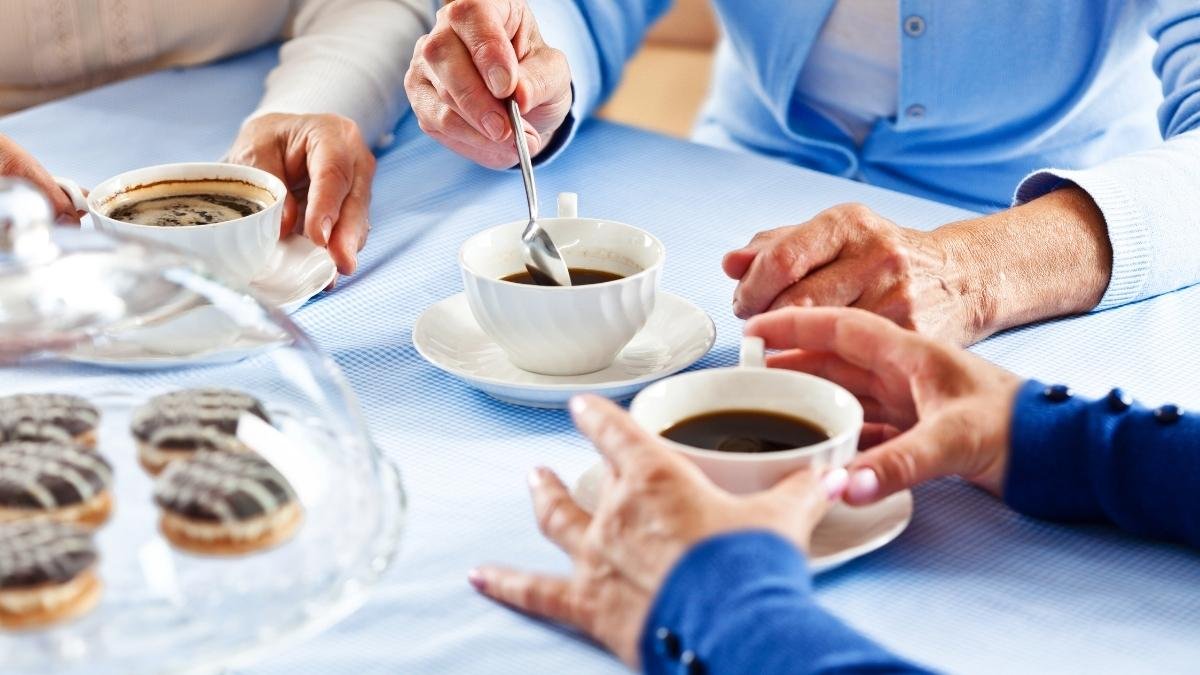
Morning coffee drinkers get longevity benefits that increase with consumption. All-day coffee drinkers? No benefit at all, regardless of how much they drink.
Sleep Has a Narrow Sweet Spot

Compared to 7 hours of sleep:
- 6 hours: 1% higher death risk
- 8 hours: 7% higher death risk
- 9 hours: 21% higher death risk
- 11 hours: 55% higher death risk
That weekend sleep-in might not be as healthy as you think.
What This Means for Your Life Right Now

Here’s the thing – this research shows that lifestyle factors account for 70-80% of longevity while genetics only contributes 20-30%.
That means you have way more control than you think.
Start with relationships. Call that friend you’ve been meaning to catch up with. Join that group you’ve been considering. Quality connections aren’t just nice to have – they’re literally life-extending medicine.
Find your purpose. What gets you up in the morning? What would you do even if no one paid you? That sense of direction could add years to your life.
Give your brain a break. All that mental chaos isn’t helping. Try meditation, take walks without your phone, or just sit quietly for a few minutes each day.
Be moderately conscientious. You don’t need to be a worrier, but taking your health seriously (like reading articles like this) is actually a longevity superpower.
The Bottom Line
The longest-lived people aren’t necessarily the ones with perfect diets or marathon-running habits.
They’re the ones with strong relationships, clear purpose, and calm minds.
They take reasonable care of themselves without obsessing.
They stay connected to their communities.
And they understand that longevity isn’t just about adding years to your life – it’s about adding life to your years.
Your move: Pick one relationship to strengthen this week. Your future 85-year-old self will thank you.
What surprised you most about these longevity findings? Have you noticed any of these patterns in the long-lived people in your own life?



